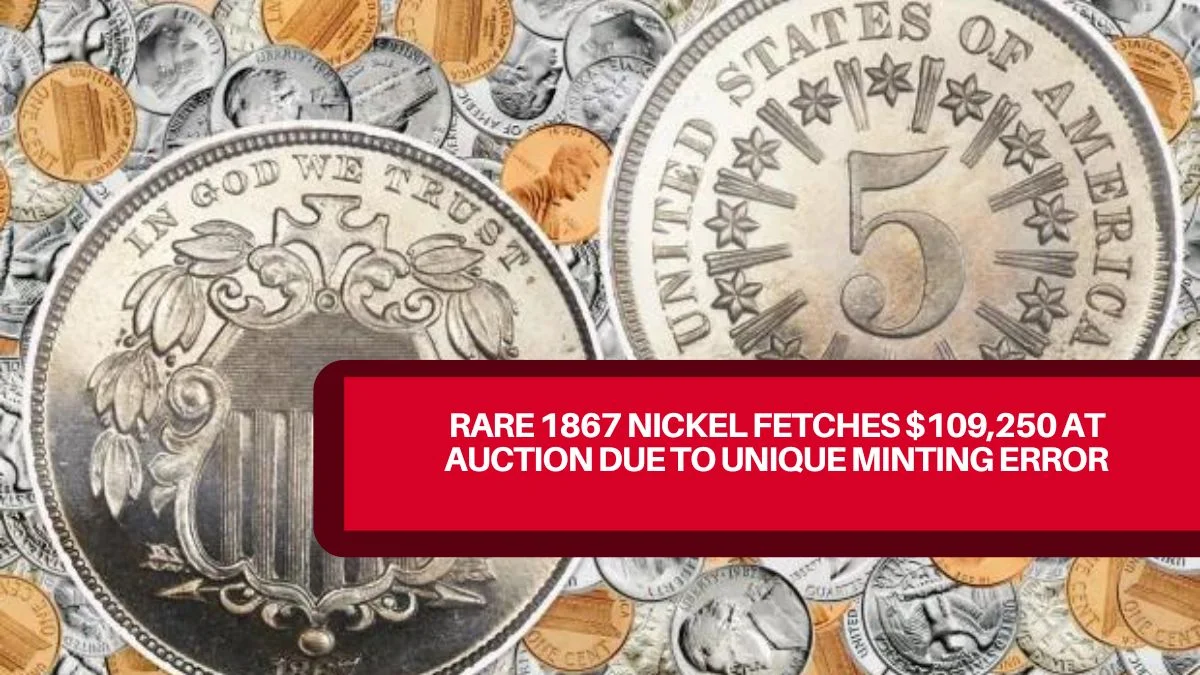Rare 1867 Nickel: A Collector’s Dream Worth Over $100,000
Owning a rare coin is like holding a piece of history in your hand, and some coins can be worth far more than their face value. One such example is the 1867 With Rays Shield Nickel, which recently sold at auction for an astounding $109,250. This nickel stands out due to its rare design, historical significance, and unique “weak” details, making it highly desirable among coin collectors. Discovering such a hidden gem is the ultimate reward for any numismatist.
What Makes the 1867 Nickel So Special?
The 1867 With Rays Shield Nickel is one of the most coveted coins in American history. It was minted during a transitional period, which adds to its intrigue. Several factors contribute to its high value:
- Year of Minting: 1867 marked an important shift in minting techniques.
- Weak Design Details: One of the key reasons for its high auction price is the coin’s distinctive “weak” details on the reverse side.
- Rarity: Coins from this period are extremely rare, especially those with design flaws or minting errors.
Key Details of the 1867 With Rays Shield Nickel
| Coin Name | Mint Year | Notable Feature | Grade | Sold Price | Rarity |
|---|---|---|---|---|---|
| 1867 With Rays Shield Nickel | 1867 | Weak Details on Reverse Side | PR66 by PCGS, CAC | $109,250 | Significantly rarer than 1866 With Rays |
Unique Features of the 1867 Nickel
This coin is packed with distinctive characteristics that make it a collector’s dream. Some of the most unique aspects include:
- Clear Lower Shield: The shield on the coin’s obverse side is free of die polishing marks, which is a rare feature.
- Detached Leaf: The highest leaf below the “R” and “U” in “TRUST” is completely detached from the shield, a detail that sets this coin apart from others minted in the same year.
The Reverse Side: Faint and Valuable
On the reverse side of the 1867 nickel, there are several notable weak areas, particularly the center ray below the second “T” in “STATES.” These faint details are one of the reasons this coin commands such high prices at auction, as they make it a rare and unique find among collectors.
Die Break Errors: A Collector’s Treasure
A die break, or cud, occurs when a piece of the die used to stamp the coin is missing, causing metal to flow into the gap and creating an error on the coin. These deformities are rare because they are usually caught by the U.S. Mint’s quality control. However, the few that slip through become highly prized collector’s items. Coins with such errors, like the 1867 With Rays Shield Nickel, are extremely valuable.
Why Is the 1867 Nickel So Valuable?
The 1867 With Rays Shield Nickel’s high value comes from a combination of factors: its rarity, weak design details, and its place in U.S. minting history. 1867 was a transitional year for minting techniques, and the design flaws that occurred during this time have made the coin incredibly desirable among collectors. Both the obverse and reverse sides of the coin feature unique characteristics that add to its allure.
For collectors, coins like this represent not only a piece of history but also a rare opportunity to own something truly special. That’s why these coins often fetch such high prices at auction.
Conclusion
The 1867 With Rays Shield Nickel is a prized collector’s item due to its rarity, historical importance, and distinctive weak details. This coin represents a pivotal moment in U.S. minting history, and owning one can be an incredibly rewarding experience. As more collectors enter the market, the value of rare coins like this one continues to rise, making them a valuable investment for anyone passionate about numismatics.
FAQs
What makes the 1867 With Rays Nickel so valuable?
Its rarity, weak details, and historical significance contribute to its high value.
How much did the 1867 nickel sell for at auction?
It sold for an impressive $109,250.
What are die break errors on coins?
A die break occurs when part of the stamping tool is missing, creating a unique error on the coin.
Why are 1867 coins rarer than 1866 coins?
Coins from 1867 are rarer due to a transitional minting period, with fewer coins made compared to 1866.
How can I identify a rare coin?
Look for unique characteristics, minting errors, or rare mint marks that set the coin apart from others.
Rare coins like the 1867 Shield Nickel are not just collectibles; they are tangible pieces of history, offering both numismatic value and an opportunity to invest in something truly extraordinary.

I’m passionate writer and digital content creator with a background in journalism. With a keen interest in exploring a wide range of topics—from technology to lifestyle and beyond—I bring fresh insights and thought-provoking commentary to the readers of Idegg.org. My curiosity and love for storytelling makes me a perfect fit for sharing the diverse, ever-evolving content the blog is known for.

